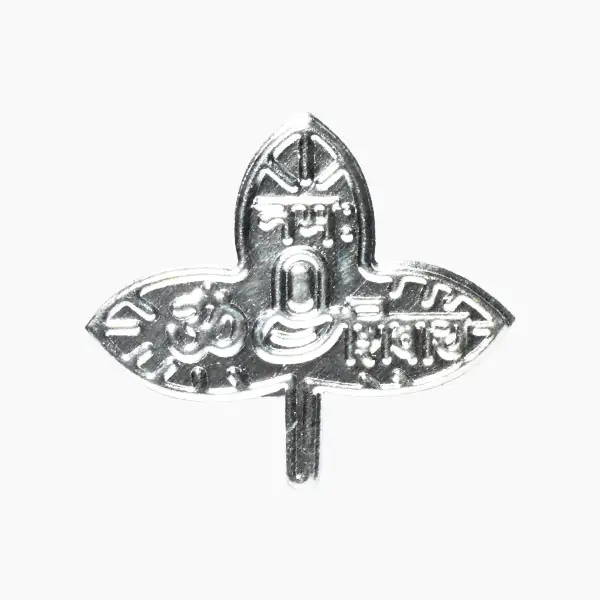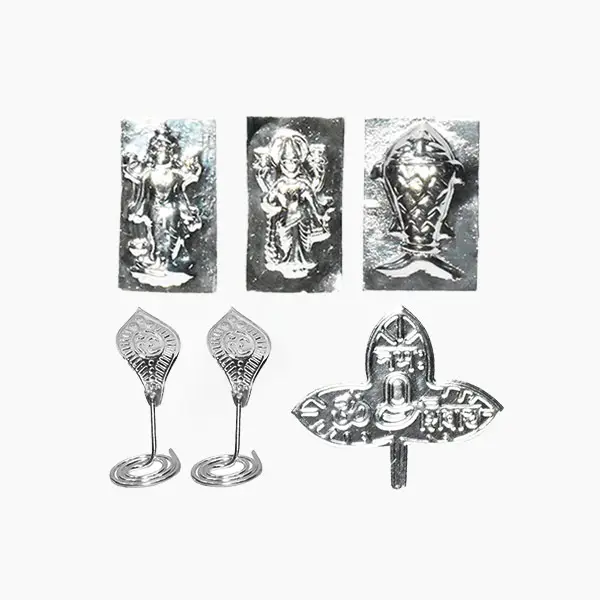
Daily Puja Benefits
Daily Puja Benefits
नित्य पूजा के लाभ
Daily Puja Benefits (नित्य पूजा के लाभ): Puja is the act of showing reverence to a god, a spirit, or another aspect of the divine through invocations, prayers, songs, and rituals. An essential part of puja for the Hindu devotee is making a spiritual connection with the divine. Most often that contact is facilitated through an object an element of nature, a sculpture, a vessel, a painting, or a print.
Most Hindus believe in an immense unifying force that governs all existence and cannot be completely known by humanity. Individual gods and goddesses are personifications of this cosmic force (Daily Puja Benefits). In practice, each Hindu worships those few deities that he or she believes directly influence his or her life. By selecting one or more of these deities to worship, and by conducting the rituals designed to facilitate contact with them, a Hindu devotee is striving to experience his or her unity with that cosmic force. (Everyday Puja Advantages)
While scholars, philosophers, and priests debate the finer points of Hindu theology, lay worshipers call upon familiar gods to help with their everyday hopes and problems.
During puja (Daily Puja Benefits) an image or other symbol of the god serves as a means of gaining access to the divine. This icon is not the deity itself; rather, it is believed to be filled with the deity’s cosmic energy. It is a focal point for honouring and communicating with the god(Daily Puja Benefits). For the devout Hindu, the icon’s artistic merit is important, but is secondary to its spiritual content. The objects are created as receptacles for spiritual energy that allow the devotee to experience direct communication with his or her gods. (Everyday Puja Advantages)
India’s multifarious age-old culture is adorned by various pujas such as Shiva puja, Durga Puja, Lakshmi Puja, Vastu Puja and other various Hindu ceremonies. All the Vedic literatures right from the Four Vedas, Puranas, Itihasa, and Upanishads to the great epic Mahabharata and the Ramayana mention the performance of Puja Pooja for appeasing the deities. Additionally, the concept of Puja is also used in the context of revering the presence of a special guest or the memories of the departed.
In their broader sense, pujas can be performed for a number of ceremonies, occasions and festivals such birthdays, marriages or new professional ventures. They are held at homes, temples or at the inaugural ceremonies of events. Pujas (Daily Puja Benefits/नित्य पूजा के लाभ) are however not obligatory rituals. One can perform on a daily basis or simply offer prayers to the deities on special occasions.
The idea or concept of Puja differs from the various schools of thoughts in Hinduism. Primarily it splits into Nigama rituals and Agama rituals; the former contains Agni (fire) without a deity image or idol and the latter includes the deity idol or image.
A worshipper lights up a oil or ghee lamp, chants mantras, sings Vedic hymns in praise of the Divine. Then eatables (fruits and sweets) are offered to the deity. These eatables after prayers become purified and become Prasadam (blessed or holy food) shared by all.
What is the Significance of Puja?
In Hinduism, PUJA is essentially a ritual or ceremonial worship, in which offerings are made to God with devotion to earn his love and blessings. Although outwardly it may appear as a mechanical ritual, it has a hidden significance.
The act of puja (Daily Puja Benefits/नित्य पूजा के लाभ) is a symbolic offering of one’s whole mind and body, thoughts, desires, actions and possessions (in short whatever one has and is) to God as a mark of devotion and surrender, enjoying whatever that comes in return as a gift from him. Probably, it originated from the Tantric methods of worship. However, it has aspects of both Vedic sacrifices and Tantric rituals, which are responsible for its simplicity and universal appeal.
Presently, puja is the most popular form of divine worship in Hinduism. It is performed either by individuals or by groups and either directly by a worshipper or indirectly by a priest on behalf of the worshipper.
It is also universally practiced in all Hindu temples. In today’s world, Puja has practically replaced Vedic sacrifices as the central feature of Hindu worship since it is easier to practice even by lay people, and the mediation of a priest is not mandatory. Technically, it is a domestic sacrifice, practiced by dutiful householders and devotees of God as part of their daily devotional service.
Vedic rituals mostly revolve around asking the gods for their favour for material gains and fulfilments and success in court cases, against adversaries and for enhancement in personal and professional life. There are rituals for realizing one’s eternal unions (oneness) with the Supreme with a spiritual spirit. The overall Vedic philosophy behind a ritual is to attain Dharma (religion), Kama (sensual pleasures), Artha (Economic prosperity) and Moksha (liberation).
Pujas in Temples & Homes:
During puja an image or other symbol of the god serves as a means of gaining access to the divine. This icon is not the deity itself; rather, it is believed to be filled with the deity’s cosmic energy (Daily Puja Benefits). It is a focal point for honouring and communicating with the god. For the devout Hindu, the icon’s artistic merit is important, but is secondary to its spiritual content. The objects are created as receptacles for spiritual energy that allow the devotee to experience direct communication with his or her gods.
Where is puja held? Hindus commonly conduct Pujas in shrines in three different environments: in temples, in the home, and in outdoor public spaces. It is equally common for any of the deities to be worshiped in any of these three types of shrines.
Hindus believe that if proper care is not taken of a temple’s images, the deity will abandon the temple. Hence priests reside at the temple and take care of the gods’ needs. Priests perform puja at sunrise, noon, sunset, and midnight. For a layperson, however, visiting a temple every day or even regularly is not mandatory, and many devout Hindus worship at home. The essential aspect of puja (Daily Puja Benefits) is not congregational worship but an individual’s offering to a deity. Worship in the home usually takes place daily.
Puja in a Temple A Hindu temple is believed to be the earthly seat of a deity and the place where the deity waits for its devotees. As such, temple structures are sacred spaces where gods partake of human offerings and in which the people can be with the gods. Many temples resemble palace architecture; this is not surprising, as deities are often considered kings. (नित्य पूजा के लाभ)
Temples are normally dedicated to one primary god. Often they are elaborately decorated on the outside with stone or plaster carvings depicting religious stories, and their decoration is specific to the deity being worshiped. Mythological scenes are juxtaposed with scenes of everyday life and important political events, such as royal coronations, conquests, and celebrations, or with portraits of royal and secular patrons. These divine images and mythological scenes on the outer walls of the temple help worshipers recall the sacred stories they have heard or read.
Every Hindu (followers of Vedic customs) family has a temple or a temple room in their home dedicated to the deity worship. They also visit temples in order to offer obeisance to the idols which are installed after ‘Pran Prathistha’. Praying at home although faithful is not as effective as praying in temples.
Ritual Pujas are best conducted under able Brahmins or priests who know Vedic rituals in detail and mantras dedicated to the same.
A full home or temple puja can include several steps. The deity is invited as a guest, the devotee hosts and takes care of the deity as an honoured guest, Vedic hymns are sung and food are offered to the deity. Generally there are sixteen steps involved in honouring a deity.
Steps of Daily Puja Benefits:
- Abhisheka: Bathing the entire deity with holy water.
- Anulepana or Gandh: It involves scents such as ittars; floral waters are applied to the deity along with sandalwood paste or vermillion.
- Arghya: Holy water is given so that the deity may wash his/her mouth.
- Asana: A seat ‘RaajGaadi’ is offered to the deity.
- Dhupa: Once floral veneration is done, next is to light up the incense sticks.
- Dip or Aarati: After the sticks, oil/ghee lamps are burned and waved in front of the deity.
- Invocation: In the first step, the deity is invoked and invited into the house.
- Naivedya: This step involves the exchange of devotional affections. Food items such as cooked rice, fruits, clarified butter, sugar, betel leaf and the like are offered.
- Namaskar or pranama: Now the devotee bows down and offers homage chanting the mantras dedicated to the deity.
- Padya: Next is the holy washing of the deity’s feet.
- Pradakshina: Then moving around or circumambulation (Pradakshina) the deity and offering the prayers followed by bowing down and leaving.
- Pushpa: This step is important as it includes offering fresh flowers to the deity. No only flowers but also the garland of flowers.
- Upaveeta or Mangalsutra: This step involves the sacred thread to be put around its neck.
- Vastram: A pure and sanctified piece of clothes are put on the deity.
This is the standard worship of the deity followed by many.
- Aabaran: Next is the step of divine embellishment. Devotees bedeck the deity with ornaments.
- Achaman: Devotees offer water to the deity who sips it.
- Chamaram: Devotees than fan the deity with fly-whisk
- Chatham: Offering the umbrella.
- Dhyana: It means meditation focusing on the deity in one’s mind and heart.
- Visarjana: Then devotees move the deity from the seat.
Daily Puja Benefits:
Puja is an important part of religious life of Hinduism. It is essential for maintaining spirituality and get a good life with blessing of almighty. It’s really important for devotees to practice good deeds and perform rituals to acquire blessing from deity. Devotees can acquire spirituality performing rituals in its traditional manner.
But, it is essential for devotees to perform ritual from learned priests according to problems. In performing ritual, puja thali is required by devotees in temple. It’s an important accessory of performing ritual beautifully and successfully by devotees. It’s not possible for a devotee to perform ritual successfully without using a good thali for carrying offerings and Arti during puja. Good quality, colours, and shaped thali is required in performing ritual successfully. (नित्य पूजा के लाभ)
Priests are advising people to perform puja daily in temple. There will be bliss, blessing and good health for the devotees. Due to time constraint, devotees often fail to visit temple for performing rituals according to problems. Performing rituals help in creating a positive vibe for people and perform good deeds leading to higher spirituality.
God statues are really helpful for devotees looking to perform puja daily at home to preserve spirituality. Keeping idols at home is useful for professionals lacking time for performing rituals daily to acquire higher spirituality. It is an ideal way of maintaining spirituality and leads a better life.
We have an old-age belief those devotees who conduct Puja (Daily Puja Benefits) and offer prayers to the God, they never return with empty hands and all their wishes get fulfilled. When you do puja, God blesses you, puts you on the right path and connects you to the right persons and opportunities. Perfect devotion and work with repeated efforts collectively helps you success in life and fulfils your desires. (नित्य पूजा के लाभ)
Pujas such as Shanti Pujas and Dosha Nivaran Pujas are also very beneficial to ward off negativity. Pujas are powerful and effective practice in one’s spiritual journey on the way to enlightenment. In addition to general Pujas; special pujas are performed during various occasions and events. For example Shravan pujas during the month of Shravan are quite beneficial for you and your entire family.
Our Pujas for Success include Laxmi Puja, Bagalamukhi Puja and SatChandi Puja. We also conduct various Dev Pujas like Shiv Puja, Laxmi Puja and Ganesh Puja. Our Siddhi Pujas include Laxmi Mantra Sidhhi chant, Mahamrityunjay Mantra Sidhhi chant, etc. For Dosha Nivaran, we conduct Pujas like Shani Dosha Nivaran, Pitri Dosha Nivaran Puja, Kaalsarp Dosha Nivaran Puja, etc.







